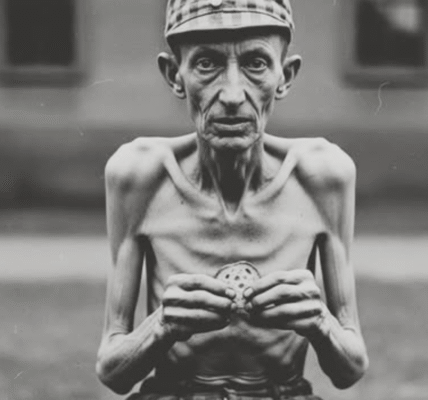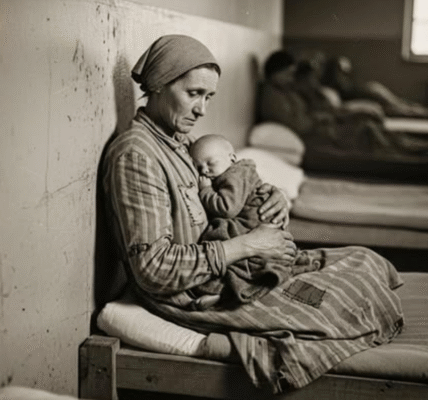The Man Who Whispered Psalms: Dachau, Germany 1944

In Germany, in the winter of 1944, Dachau was no longer just a concentration camp: it had become a vestibule of death, a place where man was transformed into shadow. Starving bodies piled up in icy barracks, their empty eyes staring at the horizon with no exit. And yet, in the heart of that endless night, the fragile, almost inaudible voice of a prisoner, reduced to skin and bones, began to mutter psalms.
His voice wasn’t a voice, but a breath, a trembling current of air carrying words older than the camp walls, more powerful than the armed guards. Those around him, lying on straw mattresses, slowly straightened. They leaned toward him like shipwrecked survivors toward a fragile flame. Each word fell like a spark into the darkness, and that spark became more precious to them than bread, more essential than water.
In Dachau, faith was torn apart under the boots, illusions crushed under orders shouted in German. Yet this whisper belied the din of barbarism. The man prayed for the dead, for the living, for those who no longer had a name. He prayed in a language some understood, others did not, but all sensed that these words formed an invisible curtain that enveloped the barracks.
One evening, his voice suddenly fell silent. Too weak, too ravaged by hunger and disease, he could carry on no longer. Then, in a silence that weighed like eternity, another prisoner took over. His voice was different, uncertain, but the holy breath persisted. Then another. And another. Soon, the psalms began to circulate from one bed to the next, like an underground chain that nothing could break. They were no longer isolated words, but a secret chorus, fragile and indestructible.
Survivors later recounted that this circle of whispered prayers sustained them. The Psalms became invisible nourishment, a force against despair. In a world where hunger devours the body, these words nourished the soul. One didn’t pray for deliverance, one prayed not to become a beast, not to succumb to the abyss. Each recited sentence was a victory over one’s tormentors, a confirmation that man cannot be reduced to suffering.
It’s worth recalling this context: Dachau was the first Nazi concentration camp, opened in 1933. By 1944, it was overcrowded, with tens of thousands of prisoners from across Europe. Epidemics decimated the weakest, while executions and forced labor finished off the rest. Yet within this factory of death, a psalm breath circulated, defying the very logic of extermination.

Historians who have examined these testimonies have discerned a unique phenomenon: prayer as an act of resistance. Not armed resistance, but spiritual resistance, invisible to the eyes of the SS, yet strengthening the soul. This is what we call today “inner resistance,” resistance that involves preserving one’s humanity even when everything around it was destroying it.
Imagine this scene for a moment: men reduced to skeletons, with sunken cheeks and sunken eyes, sitting in the icy darkness. They have nothing, not even the certainty of seeing tomorrow. And yet they whisper. These whispers grow louder than the guards’ cries, for they carry the invisible, the eternal. That’s why, seventy years later, the survivors still say that it was these whispered psalms that saved their lives.
Some survivors say they felt less alone on those nights. The community of whispered voices created a secret brotherhood. We still knew we were human because someone nearby repeated the same words, because we felt a shared faith vibrate. It was a universal language: faith for some, hope for others, but for all, resistance to dehumanization.
When American troops liberated Dachau in April 1945, many of these voices were silenced forever. But they still resonated in people’s memories. The psalms circulated through the barracks like an underground river, nourishing the lives of those who had nothing left. Those who survived said that this murmur remains proof that the soul cannot be hungry, even in the heart of barbarism.
This story, which might be considered too fragile to bear, is part of the great memory of the Holocaust. It reminds us that history is not just battles and numbers, but also fragile voices, words whispered in the darkness. And it is often in these almost inaudible voices that the greatest courage lies.
Even today, visiting Dachau is like walking through those barracks where so many people whispered to survive. Their voices no longer echo through the air, but remain within the walls, in the silence that hangs over this place. And those who listen carefully sometimes feel they hear that breath from another time, reminding us that even in hell, man sought light.




